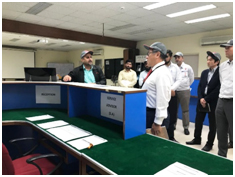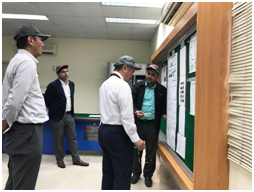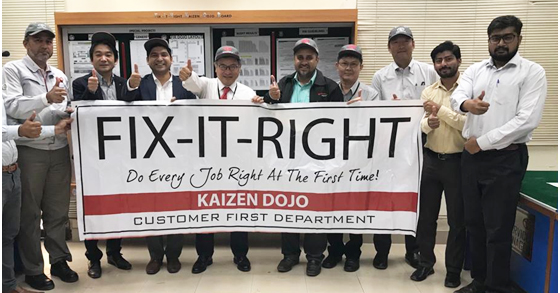Dear readers !!!
Hope you had read my last article published in Automark magazine of April edition with the title of “the significance of Dojos in Automotives” The outcome from last article was to understand the concept and importance of Dojo in the Automotive industry.
Dojo is an integral part and this program serves as a dedicated space for individuals to train and develop the arts and skills for the team, with the specific practices. The core principle of Dojo is to provide a place where the company provides an opportunity to improve the knowledge, and skills of their team, develop a character like customer handling, and bring the team as part of an exciting system by following the defined procedure, this is a powerful approach to have a focus towards the problem-solving and continuous improvement in the process that promotes cross-functional collaboration, skill development, a culture of continuous improvement, and sustainable solutions.
The Dojo training program helps to improve the quality of the products being produced, reduce costs during manufacturing, enhance innovation while practicing, standardize processes and sequence of the work, and most important, is to develop skill and talent.
This month’s article, I would like to share the success story of implementing the Dojo of Fix It Right with Toyota IMC. This “Fix It Right” dojo concept was a structured approach to problem-solving, providing a platform with a dealership network for continuous improvement in the dealership network, inspired by Lean and Six Sigma principles.
It involves bringing together a cross-functional team to rapidly identify, analyze, and solve problems or process inefficiencies in a collaborative manner. The goal is to fix the root causes of the problems rather than just addressing symptoms and to create sustainable solutions that prevent a recurrence.
The benefit of implementing the “Fix It Right” dojo concept in organizations is that this is a faster problem-solving approach, the dojo concept promotes a structured and disciplined approach to problem-solving, allowing teams to quickly identify and analyze issues, and implement solutions in a timely manner. This helps organizations address problems promptly and prevent them from escalating into larger issues.


The dojo concept provides an opportunity for team members to skill development and approach development towards their problem-solving, critical thinking approach, and analytical skills through hands-on problem-solving exercises, team members can learn and apply various tools and techniques for root cause analysis, data analysis, and solution implementation, enhancing their overall problem-solving capabilities. The dojo concept encourages bringing together individuals from different functions or departments to work collaboratively on problem-solving.
This promotes a holistic approach to problem-solving, as team members with diverse perspectives and expertise contribute their ideas and insights. This can lead to more innovative and effective solutions. By addressing the root causes of problems, the “Fix It Right” dojo concept can lead to cost savings (practicing to avoid repeat repair jobs) in the extensive, by eliminating inefficiencies, reducing defects and errors, and optimizing processes, dealerships can achieve cost reductions and improved financial performance. This can result in significant cost savings over time, contributing to the organization’s bottom line.
The dojo concept fosters a culture of continuous improvement, where teams are encouraged to identify and address problems proactively. It promotes a mindset of learning from failures and using them as opportunities for improvement, rather than blaming individuals or departments for problems.
This helps create a positive and collaborative work environment where continuous improvement becomes part of the organization. The dojo concept emphasizes addressing the root causes of problems rather than just treating symptoms. This helps organizations to implement long-term solutions that prevent the recurrence of problems, leading to sustainable improvements in processes and performance.
Employee engagement and empowerment: The dojo concept encourages frontline employees to participate in problem-solving and improvement initiatives, giving them a sense of ownership and empowerment. This can lead to increased engagement and motivation among employees, as they see their contributions making a tangible impact on the organization’s success.
The beauty of Toyota is its outstanding framework. Since Frameworks play a critical role in the automotive industry, providing a structure for designing, developing, and producing vehicles and after sales support.
Toyota provides comprehensive training and education programs for dealership personnel, including sales, after sales service, and management training. These programs aim to improve the skills and knowledge of dealership staff, allowing them to better serve customers and achieve higher sales and customer satisfaction.
As a leading automotive manufacturer, Toyota offers various programs for dealership development to support their dealers and enhance their business operations.
Overall, Toyota’s dealership development programs offer a wide range of benefits to support their dealers in improving their operations, increasing profitability, and ultimately providing the best quality service and delivering excellent customer service like with the concept of “Best in Town” Service, Quality Service to every customer.
These programs help dealerships stay competitive in the automotive market and enhance their relationship with Toyota as a business partner. These frameworks are typically complex systems that enable manufacturers to streamline the production process, improve quality control, and reduce costs.
The importance of the framework in the automotive industry enables manufacturers to produce high-quality vehicles that meet specific requirements and regulations, while also improving efficiency and reducing costs. Frameworks help to ensure that the manufacturing process is consistent and that vehicles meet a high level of quality. This is essential for maintaining customer satisfaction and loyalty.
By improving efficiency, reducing waste, and standardizing processes, frameworks can help manufacturers reduce costs and increase profitability. This is important for staying competitive in a highly competitive industry. Frameworks help to standardize the design and development process, allowing manufacturers to produce vehicles that meet specific requirements and regulations. This ensures that vehicles are safe, reliable, and meet industry standards.
Take away from this article:
Overall, the “Fix It Right” dojo concept is a powerful approach to problem-solving and continuous improvement that promotes cross-functional collaboration, skill development, a culture of continuous improvement, and sustainable solutions. By implementing this concept, organizations can achieve faster problem resolution, improve their processes, engage and empower employees, and drive overall organizational success. So, it is worth considering as a valuable approach for organizations seeking to improve their problem-solving capabilities and achieve sustainable improvements in their operations.
In the last, I’d like to share a quote that I found really impactful: “If you don’t step forward, you will remain in place”. So, keep moving!
This article has been published in Automark Magazine’s May-2023 printed edition.
